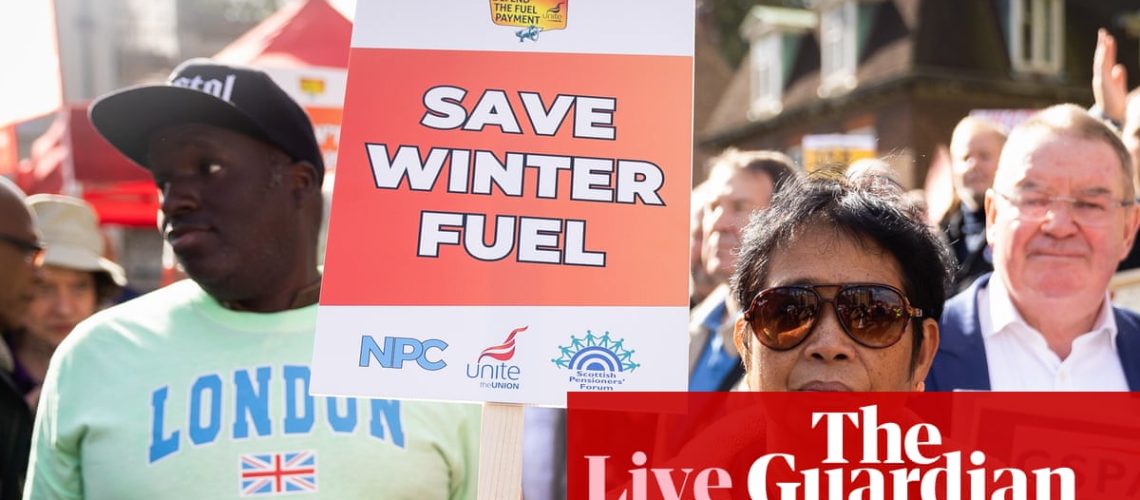Winter fuel payments U-turn likely to lead to higher tax, or alternative benefit cuts, says IFS director
The Treasury says restoring the winter fuel payments for most pensioners will cost around £1.25bn in England and Wales. It says:
The costs will be accounted for at the budget and incorporated into the next OBR forecast. The chancellor will take decisions on funding in the round at that forecast to ensure the government’s non-negotiable fiscal rules are met. This will not lead to permanent additional borrowing.
Paul Johnson, director of the Institute for Fiscal Studies, says ‘no extra borrowing’ means ‘higher taxes, or welfare cuts’.
The corollary of “this will not lead to permanent additional borrowing” is that it will lead to permanent additional taxes (or just possibly permanent cuts to other bits of welfare).
Key events
SNP government says it is awaiting details of how Labour’s new WFP policy will affect Scotland

Severin Carrell
Severin Carrell is the Guardian’s Scotland editor.
The Scottish government has complained that it still has little detail of how the substantial reversal of the winter fuel payment cut will affect its budgets, and asked for clarification.
Shirley-Anne Somerville, the Scottish social justice secretary, said:
I welcome any extension of eligibility by the UK government, but this is a U-turn the chancellor [Rachel Reeves] should have made a long time ago. But there is still no detail about how the chancellor intends to go about that. Unfortunately, it still sounds as if many pensioners will miss out.
We have once again not been consulted on the policy and its implications in Scotland and will scrutinise the proposals carefully when they are announced. I would therefore urge the UK government to ensure the Scottish government is fully apprised of the proposed changes as soon as possible.
Reeves’ decision only affects pensioners earning up to £35,000 in England and Wales. The payment has been devolved in Scotland for some time, but Scottish ministers had been slow to implement and award their first payments – despite its rhetoric about the UK government’s “betrayal” of pensioners.
It is unclear why Scottish ministers need to be consulted over a payment decision affecting England and Wales, about a policy which is devolved. The Scottish government also had a record Treasury grant this year, partly funded by cuts to this benefit – cash which enabled ministers in Edinburgh to restore the payment in full in Scotland.
However, the Treasury has not yet said how much money this change in England and Wales will generate for the Scottish and Northern Irish governments (devolved governments receive a proportional share of any increase in spending in England under the Barnett formula). That uplift will allow ministers in Edinburgh to spend more in politically advantageous policy areas.
Farage accused of ‘fantasy politics’ after suggesting Reform UK might reopen mines and steel blast furnaces in Wales
Nigel Farage, the Reform UK leader, was speaking about winter fuel payments at his event in Port Talbot (see 12.28pm), but the main point of his speech was to call for the reindustralisation of south Wales. In comments that had been well trailed in advance, he said that he wanted to reopen mines and reopen the blast furnaces at the Port Talbot steelworks.
In his speech he said:
Our ambition is to reindustrialise Wales.
We are going to be using more steel over the next few years than we probably ever used as we increase military spending and as we attempt a house building programme in Wales, and even more so in England, of massive proportionsj just to catch up with the population explosion over the last 20 years. We are going to need a lot of steel.
Our belief is we should be producing our own steel. Our belief is, for what use coal still has, we should produce our own coal …
I’m not saying let’s open up all the pits. What I am saying is there’s coal, specific types of coal, for certain uses that we still need in this country, and we certainly will need for the blast furnaces here, that we should produce ourselves rather than importing.
But, during the Q&A, a BBC reporter put it to Farage that industry sources saying reopening the blast furnaces at Port Talbot would be impossible. Asked about this, Farage conceded that reopening a blast furnace would be very difficult. A new one might be needed, he said.
He replied:
Once a blast furnace has been closed down, to actually reopen that particular blast furnace is very, very difficult. Nothing’s impossible, but it might be difficult. It might be easier to build a new one.
Could a Welsh government, Welsh devolved government, do it on its own? It would need some help from national government too, which is why I phrased all of this this morning very, very carefully into saying, not ‘we will do this once we’re in control in Cardiff’, [but] ‘this will be our ambition, we’d need a Westminster government to approve this as well’. Who knows, that might be us in time. And we’d need to work with companies as well. But, as an ambition, it’s the right one.
And, on mining, asked if there was any evidence that Welsh people want their children to go down mines again, given so many miners wanted their sons not to have to do these dangerous jobs, Farage replied:
If you offer people well-paid jobs, you would be surprised, many will take them, even though we’d all accept that mining is dangerous.
As WalesOnline reports, Welsh Labour have dismissed this as fantasy politics. A Welsh Labour spokesperson said:
Nigel Farage has no plans for steel – just a camera crew. You can’t restart a blast furnace with a press conference.
Nigel Farage says that hopefully they mightthey’ll bring back mining. The people of Wales will see through the false hope and false promises of a public-school boy from England who does not understand them and does not understand Wales.
His answer is to bring back the mines. The only thing Nigel Farage is trying to mine is votes from communities that have already gone through tough times. Nigel Farage has today brought his fantasy politics and magic money tree to Port Talbot. He’s gambling with real people’s livelihoods.
New winter fuel payments policy ‘only marginally progressive’, says Resolution Foundation thinktank
The Resolution Foundation, a thinktank focusing on the interests of low and middle earners, says the new winter fuel payments (WFPs) policy is “only marginally progressive”. In a briefing note it says:
According to DWP caseload data, in 2023-24 around 11.6 million pensioners received WFPs at a cost of around £2.2bn. Last winter (2024-25), around 1.3 million pensioners received WFPs at a cost of around £300 million. Next winter (2025-26), under these plans, around 9 million pensioners will receive WFPs at a cost of around £1.6bn.
The new scheme is only marginally progressive, with 57% pensioners gaining from the new policy in the bottom half of the income distribution, and the remaining 43% in the top half.
In tax/benefit policy terms, “progressive” means benefiting poorer people more than richer people.
Alex Clegg, an economist at the thinktank, said:
The new scheme for means-testing winter fuel payments means that that the number of pensioners receiving support will rise from 1.3 million last winter to around 9 million this winter, and not far off the 11.6 million who received winter fuel payments two winters ago when they were universal.
But this U-turn doesn’t represent a return to the status quo. The new means-test will create new complexity in the tax system, including a cliff-edge for those with around £35,000 of income. The reported savings of £450m will be reduced further by the cost of increased pension credit take-up as a result of the original policy, and the cost of administering the new means-test.
The real question is why it is now a priority to pay winter fuel payments to over three quarters of pensioners, with almost half of the new beneficiaries in the richest half of the population, when previously it was judged that only one-in-ten needed support.
Faisal Islam, the BBC’s economics editor, is also arguing that today’s announcement shows that last year’s winter fuel payments cut could be seen as pointless. He has posted these on social media.
quite the u-turn…
the entire policy of limiting the WFA will now raise £450m a year… essentially everybody will get it and then those 2m with above £35k income will have it clawed back from HMRC…
Was it worth it? At the time when we were briefed, somewhat shocked, that the Chancellor was doing it, the rationale was that this was something that could be done “in year”…
… it did have the air of a policy that was done as a totem for the markets, that the Government could do very tough decisions, that previous administrations had shied away from…
A key problem, was that it was unclear that it would even save money net net. Eg Liz Kendall said to me that one of the benefits was to incentivise pension credit (£thousands) take up… but that would have meant it would not have raised much at all…
In a post on the BBC’s website, Chris Mason, its political editor, says many people in the Labour party see cutting the WFP last year as the government’s biggest mistake in its first year in office.
Robert Peston, ITV’s political editor, has posted a damning verdict on the government’s handling of the winter fuel payments issue on social media. Here is an extract.
So the u-turn only goes to prove the utter pointlessness of the original abolition last summer of the universal entitlement to it.
This initial £1.6bn saving – revised down to £1.3bn by the OBR – was supposedly essential to placate lenders to the British government, bond investors, who Reeves believed needed reassurance that she would fill the hole in the public finances she said she inherited from the previous Tory government.
But it was always a drop in the ocean of the government’s borrowing needs – and remains so, even after the £40bn of tax rises that she imposed in last autumn’s budget.
Or to put it another way, most economic forecasters believe today she is likely to need tax rises this coming autumn, just as they did a year ago. Yet a year ago, Reeves argued any unfunded spending commitment would be fiscal suicide, whereas today such an unfunded commitment is tickety boo.
In other words, she and the Treasury have achieved a rare – though not unique – distinction of alienating vast numbers of British voters for next-to-zero fiscal or economic benefit.
The SNP says the government should follow the winter fuel payments U-turn by reversing the two-child benefit cap. In a response to the Treasury announcement, Stephen Flynn, the SNP leader at Westminster, said:
The chancellor must now abandon her devastating cuts to disabled people – and scrap the two-child benefit cap.
This screeching U-turn was inevitable and lessons must be learnt from the damaging mess the Labour government caused by robbing pensioners of their winter fuel payments.
It must be swiftly followed by an end to all Labour party austerity cuts – scrapping the planned cuts to disability benefits and abolishing punitive welfare policies, including the Labour government’s two-child benefit cap and bedroom tax.
At 3.30pm there will be an urgent question in the Commons about “the United States government’s national security concerns regarding the proposed Chinese embassy development at Royal Mint Court”. The former Tory leader Iain Duncan Smith is asking the question, and a housing minister will reply.
Later, at about 4.15pm, Torsten Bell, the pensions minister, will make a statement about the winter fuel payments announccement.
No 10 accuses Reform UK of ‘fantasy economics’ as it rejects claim it has adopted Farage’s winter fuel payments policy
Nigel Farage has claimed credit for the government’s winter fuel payments U-turn. But the government has not resinsted the payments for everyone, which is what Reform UK was asking for.
At the Downing Street lobby briefing the PM’s press secretary said there was a big difference between the two policies, because Reform UK’s was unfunded. She said:
We set out the policy detail now to ensure the change can be delivered ahead of winter and give pensioners certainty.
Everything this government does is fully funded.
Reform has floated tens of billions of pounds of unfunded tax cuts, they’ve suggested slashing government spending to 35% of GDP, which is equivalent to scrapping the entire NHS, defence, policing and criminal justice budgets combined.
Their fantasy economics would see the exact same consequence as working people suffered under Liz Truss and the Conservatives, and is why this government has totally rejected that approach and put fiscal responsibility at the forefront of every decision that we take.
Reeves rejects calls to apologise for winter fuel payments cut last year
Rachel Reeves, the chancellor, has rejected calls (see 12.18pm) to apologise for removing winter fuel payments from most pensioners last winter.
Asked in an interview with ITV News if she would apologise for causing “unnecessary anxiety and hardship”, Reeves replied:
The irresponsible thing to have done last year was to allow the public finances to carry on on an unsustainable footing.
That would have resulted in interest rates going up, costing families and pensioners more in mortgages and rents.
I’m always going to put stability in our economy first.
Here is the clip.
Chancellor declines to apologise to pensioners over winter fuel confusion
Asked by @ShehabKhan if she’ll say sorry for causing ‘unnecessary anxiety’, the chancellor insists it would have been ‘irresponsible’ if she hadn’t cut the payments last year because of the public finances pic.twitter.com/JaLdAn2Q8P
— ITVPolitics (@ITVNewsPolitics) June 9, 2025
HMRC will not try to recover winter fuel payments from wealthy pensioners who die, No 10 says
At one point the Treasury was concerned that, using the tax system to claw back winter fuel payments from wealthy pensioners could lead to the government trying to recoup the money from the estates of pensioners who died over the winter.
But today Downing Street has said this will not happen. At the morning lobby briefing the PM’s spokesperson said:
HMRC will not ask for repayment from a deceased PAYE (pay as you earn) customer if the only money owed was from a winter fuel payment.
Winter fuel payments U-turn likely to lead to higher tax, or alternative benefit cuts, says IFS director
The Treasury says restoring the winter fuel payments for most pensioners will cost around £1.25bn in England and Wales. It says:
The costs will be accounted for at the budget and incorporated into the next OBR forecast. The chancellor will take decisions on funding in the round at that forecast to ensure the government’s non-negotiable fiscal rules are met. This will not lead to permanent additional borrowing.
Paul Johnson, director of the Institute for Fiscal Studies, says ‘no extra borrowing’ means ‘higher taxes, or welfare cuts’.
The corollary of “this will not lead to permanent additional borrowing” is that it will lead to permanent additional taxes (or just possibly permanent cuts to other bits of welfare).
As the Treasury explains in its news release about the winter fuel payments proposal, although the government is basically restoring winter fuel payments (and clawing them back from the wealthy), it is changing the way payments are being delivered. It says:
Where the household is not getting an income related benefit, such as pension credit, a shared payment will be made – e.g. a couple, each under 80, not on pension credit will receive a payment of £100 each.
This reflects the fact that benefits are often paid on a household basis, but the tax system, which is being used to recoup the payments to wealthy people, looks at individual income.
In a post on social media, Paul Johnson, director of the Institute for Fiscal Studies thinktank, says this new arrangements is a bit “messy”. He explains.
WFP will now be paid at £100 to each member of a couple.
So rich pensioner couples, where one has say £100k and the other £30k, will still get £100.
If both members of couple have £36k then they get nothing.
Messy.
Farage joins Tories and Lib Dems in claiming credit for getting goverment to U-turn on winter fuel payments
In his speech in Port Talbot Nigel Farage, the Reform UK leader, accused the government of timing its winter fuel payments to overshadow his speech. And, like the Tories and the Liberal Democrats (see 12.18pm), he also claimed that he had forced the U-turn.
I kept on saying all but the very wealthiest pensioners should get the winter fuel allowance, particularly as we have the most expensive energy costs in the world directly as a result, of course, of the fanatical embrace by both Conservative and Labour governments of net zero.
To illustrate his point, Farage waved a copy of the Daily Express which splashed on Farage’s views on this.
Farage said there was “no doubt” in his mind that his campaigning “made the political weather on this one”.















